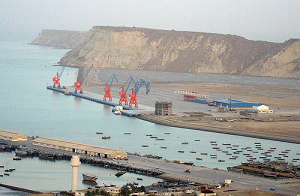The China-Pakistan Economic Corridor Between Hope and Fear
By Mushtaq A. Kaw
April 26, 2017, the CACI Analyst
In December 2016, China’s Ambassador to Pakistan, Zhao Lijian, stated that “CPEC is working well” with the support of the Pakistani people, notwithstanding certain opposition. The statement is characteristic of China’s and Pakistan’s praise for the China-Pakistan Economic Corridor (CPEC) as a game changer for their respective economies and regional connectivity. Yet in reality, the project faces a variety of intricate economic challenges as well as security threats. Its success will therefore depend upon an inclusive, balanced and sustained China-Pakistan approach towards the forces hostile to the project. Even then, the project will have various geopolitical, geo-economic and geo-strategic implications for the region and the world.

Deeper Afghanistan-India cooperation must not isolate Pakistan
By Sudha Ramachandran
December 15th, 2016, The CACI Analyst
India-Afghanistan relations have warmed considerably in recent months. During Afghan President Ashraf Ghani’s visit to Delhi in mid-September, the two countries deepened their defense and security co-operation and signed an extradition treaty. India also pledged US$ 1 billion towards capacity building in Afghanistan. A few days later, when the Lashkar-e-Taiba, a terrorist group with close links to Pakistan’s Inter-Services Intelligence (ISI), attacked an Indian Army base at Uri in Jammu and Kashmir, Afghanistan came out strongly in support of India. The renewed Delhi-Kabul bonding is likely to have stirred Islamabad’s anxieties. ISI and its terrorist protégés could step up attacks in Afghanistan and India in the coming months.
Unrest in Gilgit-Baltistan and the China-Pakistan economic corridor
By Sudha Ramachandran
September 29th, 2016, The CACI Analyst
Rising unrest in Gilgit-Baltistan and India’s growing assertiveness in laying claim to this region has set alarm bells ringing in Islamabad and Beijing. After all, Pakistan’s control over Gilgit-Baltistan is essential for the success of the China-Pakistan Economic Corridor (CPEC) project. China is pressing Pakistan to legalize its relationship with Gilgit-Baltistan. Pakistan’s options are fraught with risk.
The Tashkent summit and the expanded SCO
By Farkhod Tolipov
July 27th, 2016, The CACI Analyst
50 years ago, Uzbekistan’s capital Tashkent hosted a summit ending the India-Pakistan war of 1965, resulting in the Tashkent Declaration. It was, so to speak, a Soviet “Camp David” aimed at bringing two antagonists – India and Pakistan – to peace. The SCO summit of June 2016 was, symbolically speaking, a second – multilateral – platform created in the same place, Tashkent, for the same two states to restore peace. Yet this summit did not appear to be a second Tashkent “Camp David,” but rather a challenge for the SCO itself.
Afghanistan risks water conflict with Iran
By Sudha Ramachandran
July 30th, 2016, The CACI Analyst
Afghanistan’s damming of the Harirud River could boost agriculture and industry in the country. However, the resulting reduction in water flow to Iran could contribute to a deterioration of relations with Tehran. Afghanistan and Iran can no longer delay a dialogue on how to share the waters of the Harirud. Afghanistan has previously blamed its reluctance to engage in such a dialogue on a lack of requisite data and expertise, but can ill afford a conflict with Iran on this issue.







